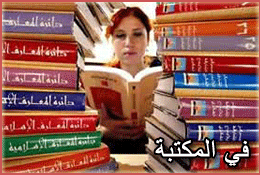-
@Desmond
Wow, some incisive insights. Without being overly rigorous I guess I might have thought (had I even thought) that the use of the definite article in the fourth line for ﺒﻌﺾ (ba’D) might not be too surprising given the somewhat determinative phrase "children's books" in the preceding line.
In English, a bookstore owner asked that question might then think of "the children's books" as a (somewhat) defined quantity.
Your questions remind me of my unanswered question in January's "finding a lawyer" podcast wherein an 'iDaafa construction is used for the wholly indefinite phrase "business lawyer":
"2. I was quite surprised by idaffa (phonetic) construction used for "business lawyer." I would have guessed something more like lawyer business with the "business" being an adjective. The idaffa construction suggests to me a "lawyer who belongs to business" (like door of the classroom) which stretches the idaffa construction a bit." -
@ chazyouwin
Thanks for your appreciative remarks, Charles. The fact that ﺍﻠﺒﻌﺾ refers back to a noun phrase meaning “children’s books” doesn’t explain the use of the definite article here. I can’t think of any logical explanation, and I don’t know any other language where a definite article would be used in this type of context. In the English sentence “There are some in that corner” the word “some” is an indefinite pronoun, the the fact that a native speaker of English will know what it refers to will not make it definite.
Arabic logic is evidently quite different from European logic. Why, for instance, do Arabs use feminine singular adjectives with masculine nouns denoting things?
I don’t see anything odd about muhaamy (ﻤﺤﺎﻤﻲ) sharikaat (ﺸﺮﻜﺎﺖ). In English we say “corporate lawyer”, while Arabs say “lawyer of companies”. There is no article before the second term of the 'iDaafa construction when the genitive construct denotes an indefinite concept (in this case “a corporate lawyer” as opposed to “the corporate lawyer”).
Muhaamy (ﻤﺤﺎﻤﻲ) sharikaat (ﺸﺮﻜﺎﺖ) is like kutub (ﻜﺗﺐ) 'atfaal (ﺃﻂﻓﺎﻞ), which means “children’s books” (not “the children’s books”). If we wanted to say “the children’s books” we would have to put a definite article before 'atfaal (ﺃﻂﻓﺎﻞ). -
انا اتفق مع تعليقات ان هذا الدرس سهل لطلاب متوسطين ولكن لا تتذكر لما تسمع صباح الخير في مصر الرد المناسب صباح العسل او صباح القشدة
Intermediate - At the bookstore
| March 27th, 2012 | 1 comment |
Many of us like to frequent the bookstores, so today we're teaching you how to ask for certain types of books, such as novels and dictionaries. Tune in to learn a typical conversatiion that can occur in a bookstore.
 |
 MP3 Download MP3 Download
 PDF Transcript PDF Transcript
|
 Audio Transcript Audio Transcript Exercise Exercise PLC PLC |
|
| Basic | Premium | |
|---|---|---|
Join the Discussion

Random Word
طيب |
|

Advertisement



Several podcasts might be devoted to ﺒﻌﺾ since this word can be used in many different ways and belongs to the core vocabulary of Arabic. Like ﻨﻓﺲ (nafs), Ba’D is a content word that has been transformed into a function word. Ba’D originally meant “part”, but in this sense it has been supplanted by ﻗﺴﻢ (qism).
In coursebooks of Arabic ﺒﻌﺾ is sometimes presented in a rather confusing manner because its various functions are not always clearly distinguished. I think it might be helpful to assign the various uses of ﺒﻌﺾ to four categories since it can be used as (1) an indefinite pronoun, (2) a determiner, (3) a reciprocal pronoun, and (4) an adverb.
As I have already pointed out, ﺒﻌﺾ is employed as an indefinite pronoun in the podcast about the bookstore.
ﺒﻌﺾ is employed as a determiner in the podcast about rainfall (Ehab talks about “some regions”). In this case it is easy to explain the use of the definite article. “Ba’d al-manaatiq” (some regions) literally means “the part of the regions”, just as “ba’D al-'ayyaam” (some days / a few days) literally means “the part of the days”. In such cases we have to do with a bipartite 'iDaafa construction where the article has to be attached to the second term. It remains to add that ﺒﻌﺾ can take a pronominal suffix. Thus, for instance “some of us” can be rendered as ﺒﻌﻀﻨﺎ (ba’Dunaa).
When ﺒﻌﺾ is used as a reciprocal pronoun it normally has to be doubled. If the verb is transitive the first ﺒﻌﺾ has a pronominal suffix (e.g. ba’duhum) while the second has either the definite article or tanween (e.g. ba’Dan). This rule will apply to sentences like “The boys hit each other”. If the verb is intransitive ﺒﻌﺾ is not doubled. It is merely preceded by a preposition like ﻤﻊ (ma’a) and extended by a pronominal suffix. This rule will apply to a sentence like “They talk to each other”.
Finally, ﺒﻌﺾ can be used as an adverb if we want to translate a sentence like “They all live together”. In such cases ﺒﻌﺾ is doubled and preceded by the preposition ﻤﻊ (ma’a). The first ﺒﻌﺾ has a pronominal suffix, and the second has the definite article.